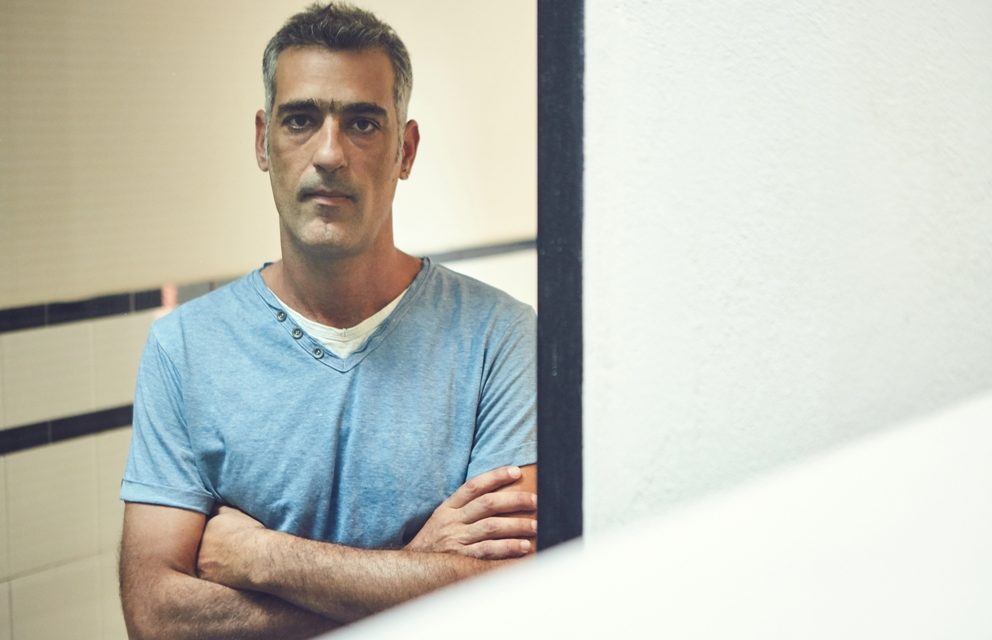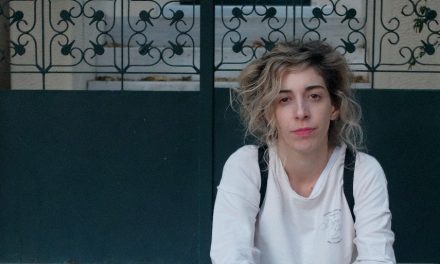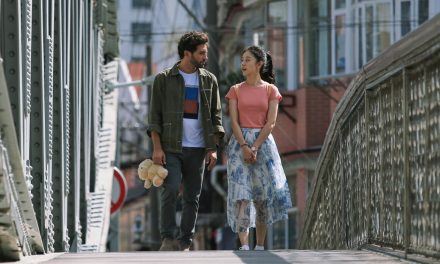“Her Job” is a film about Panayiota, a stay at home mum, set on survival mode for quite long and living with a domineering husband who is out of work. As the economic pressure increases on her family, semi-illiterate Panayiota will get a job for the first time in her life, as a cleaner in a mall. Stranded with what most would regard as a humble dead-end job, Panayiota will for the first time in her life feel a sense of autonomy, while she slowly gains some kind of visibility in her family.
By shedding light on the heart of the modest people, film director and co-scriptwriter Nikos Labot manages to draw quite a realistic portrait of a Greek low-income family whose life has become even more difficult on account of the crisis. And although the crisis is a focal point of the film, it is also the story of woman’s emancipation that has oddly been achieved through labour exploitation. If the protagonist finds joy in life through working overtime cleaning toilets, it makes you think about women’s position in contemporary Greek society.
Nikos Labôt studied film directing in Athens, Greece. He has worked on feature and short films as well as in television in Greece and France. He has directed a creative documentary, music videos, two theatre plays and three short films. His last short film “The Dog” (2009) participated in numerus international film festivals and won many awards. “Her Job” premiered in the International Competition section of Thessaloniki International Film Festival and won Best Actress Award for its protagonist Marisha Triantafyllidou. Nikos Labot talks to Greek News Agenda* about how he built his characters, the effects of the crisis on Greek society and why “Her Job” is a feminist and political film.
In “Her Job” you’ve built a painfully recognizable portrait of patriarchy. Did you have a Greek background alone in mind when writing the script?
It is true that while working on the early script version we did dig into a certain family profile. Afterwards however I had to make this story mine, so I had to dig deeper into Panoyiota’s and her family’s world, in order to depict their reality. I observed, reflected on and borrowed instances from the lives, attitudes and behaviours of a number of people. I began with those in my close family circle, including my mother and other close relatives, because I could detect shared characteristics with the family in my film. I also met with cleaning ladies who told us their stories. I let them read the script and we discussed their working conditions.
Marisha Triantafyllidou, “Her Job” (2018)
In your film, the dignity of work rubs shoulders with the dehumanizing capitalist practices that turn human beings into numbers. Which of the two prevails?
In the film we observe, without any exaggeration whatsoever, the working practices of several cleaning companies in Greece. Not all of them operate as such, but as I found out from research I conducted for years and from workers testimonies, many of them sign blank paperwork or documents declaring that they work fewer hours and paid higher wages than they actually work and earn. And all this takes place under pressure and exertion. If they don’t accept these terms, they will either not get the job or find themselves fired. More and more companies take this course of action on the pretext of the crisis, but this was certainly happening before crisis too.
At the same time, we follow the path of a housewife and mother who goes out to get a job for the first time in her life so as to economically contribute to her family. She really needs to get a job and then keep this job. And it’s interesting to see that through this process she discovers many things that will subtly change her. She makes friends, earns her first income, contributes to her family and gradually transforms into a different person. Despite the exploitation she endures, the injustice she witnesses and the humiliating working conditions, she gains awareness, earns the respect of others and discovers a different self. Thus in an odd way she experiences a kind of emancipation at the age of 40 instead of 20. She undergoes experiences that inadvertently give her strength for the future.
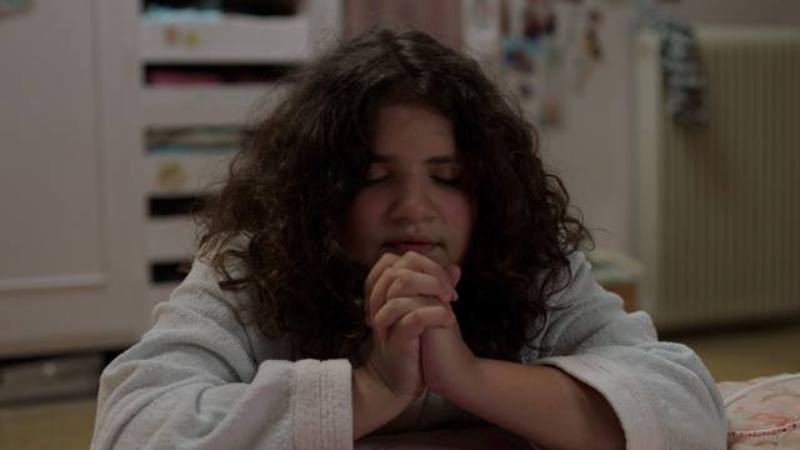
Danae Primali, “Her Job” (2018)
There is an equally interesting subplot, the daughter’s story. She feels socially excluded, while her mother enjoys her fair share of daily struggles, with the Greek economic crisis always as a background. Would you describe “Her Job” as a feminist film or as political commentary?
The subplot concerning Panayiota’s daughter is decisive for Panayiota’s own development. The subplot was originally broader, but I decided when editing to focus on Panayiota so that we could follow her closer. It is for the sake of her family, especially her children that Panayota initially decides to go out and work. Up to that point and after Panayiota gets the job, her daughter is mostly negative towards her, reacts against her, underestimates her and considers her partly responsible for her fate.
The story of Panayiota describes the injustice and absurdity of a system that is reproduced within the dominant patriarchal system of our society. The issues the film deals with are women’s empowerment, their role in modern society, working conditions and how these connect.
“Her Job” is therefore a feminist (and obviously political) film, not only because it’s set during the crisis and depicts the image of a decadent society (through its social and labour relations), but also because it talks about women’s oppression in both family and working environment. Thus the issues raised by the film run deeper and are not relevant to the crisis alone, or just Greece. Similar stories could be found in several societies around the world, whether they’re undergoing a crisis or not.
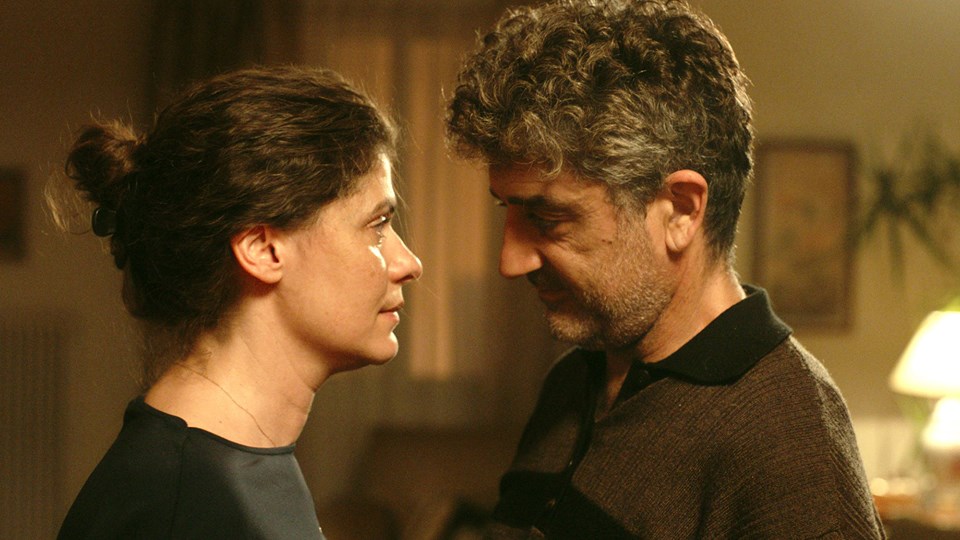
Marisha Triantafyllidou, Dimitris Imellos, “Her Job” (2018)
A key point in the film is the husband’s reaction. He undervalues his wife, and even when she becomes the sole breadwinner, his opinion does not improve. In “Her job” male chauvinism competes with capitalism when it comes to exploitation. Has the financial crisis exposed these dysfunctional family relationships or has it been a catalyst to make them even worse?
As far as Panayiota’s husband is concerned, I’d say that while at first he does not seem to accept the changing situation, we do also see his more sentimental side. He takes a few small or considerable steps back as he sees that Panayiota contributes decisively, changing the family’s life. Hence there are minor improvements, but I’d rather not say more and let viewers discover for themselves.
Obviously, in the course of the economic crisis, many dysfunctions and deeper problems in family relationships have come to light, while at the same time the crisis aggravates the problems. We are constantly witnessing dreadful acts by men as well as women, and this usually involves lower-class, low-educated people who see no escape. Without a doubt, violence (psychological, verbal and physical) combined with depression is prevalent in many households, and there, unfortunately, is no state structure to help the situation at any level.
Marisha Triantafyllidou, Maria Filini, “Her Job” (2018)
You prefer sensitive observation and reserved tones along with an open end. But still the spectator can’t help but identify with and feel for the characters, especially Panagiota. What are your cinematic influences?
I was always excited by the idea of making a movie where the viewer cannot make out if what he sees is fact or fiction. Consequently, I wanted to make an attempt to approach as closely as possible a situation which when seen on screen really touches viewers without them giving thought if these are actors, settings, costumes and so on. The only way to achieve this was to speak directly to viewer’s sentiments, without much talk or explanation and the only reality being the film running on the screen, so that he could experience the same emotions, and not distance himself from the characters or judge them. Shortly before we finished editing, we conducted some restricted screenings in France and I was pleased to find that a lot of people were wondering if it was a documentary, or if this woman is the real Panayota and not an actor.
I consciously did not refer to any director or movie. There are, of course, a number of directors whose realism I enjoy, such as Kiarostami, Faradhy, the Dardenne brothers, Stéphane Brizé etc. and I suggested some of their films for the main actors to view. But I felt the need to create our own realism; otherwise there’d be no interest for me. In order therefore to achieve this realism and to capture these moments in life, I decided to follow my characters in their small, everyday, silent moments where intense feelings lurk but do not shout.Panayiota is a frightened, unconfident woman and has learned not to speak up much, because in this family the man always has the first say. Changes that come into her life come subtly and unknowingly, which she does not really understand nor does she know how to handle them. So she prefers to remain silent and do things quietly. In real life, we do not usually say our thoughts aloud and that was something I wanted to be evident in the film. A shot of silent woman is more powerful than the sound of her thoughts.
Read also reviews by Hollywood Reporter, The Playlist, Cineuropa and College Movie.
* Interview by Florentia Kiortsi

